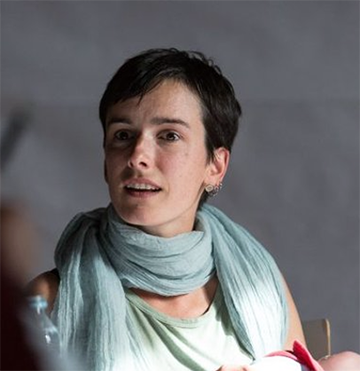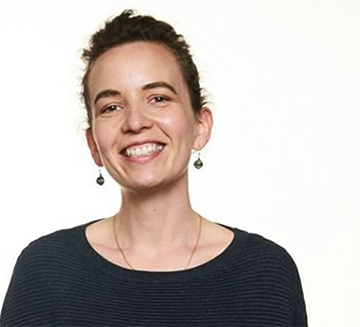The Feminisation of Politics is a phrase – as well as an idea – that polarises political discourse and then shatters it into a million new inquiries. This essay will not capture the whole of the history and future of the new discourse arising, but simply point at what we can see – or I am seeing – as it moves towards us at speed.
To share just an entry point into the vast new room of political life now opening, let me offer the issue of my credentials for writing this piece. What would actually qualify me – or recommend me – as a documenter of this new phenomenon? First, there is my ‘spotlight’ biography: what I have achieved in public life – as a journalist, consultant and Co-initiator of The Alternative UK. But is that old paradigm? Should I instead share my ‘internal journey’, as a citizen, a Buddhist, a Mother of a boy? Or is there something more relevant still, around my perspective as a witness of evolution? Through what lenses am I perceiving this emergence? All of these questions become relevant through the feminisation of politics.
It’s like moving from comparing cars, to comparing the experience of driving, to suddenly now questioning why we are driving at all? Or comparing even. And all these rapid changes of perspectives are occurring while we are breaking the speed limit.
Suffice to say, this essay will embrace all of these ideas of ‘how we show up’ in the writing, in the hope of sharing a bit of the journey with you.
Feminism in transit
Before ‘the feminisation of politics’ became a focus, we already had the history and development of ‘feminism’ present in our culture, taking ‘a part’ in our collective transformation. Forgive all the parentheses, but they indicate phrases which are themselves in transit on the journey I’m describing.
I’m not qualified to talk about feminism objectively, because as a Eurasian woman of Indonesian / Dutch descent, I didn’t take part in the discourse as it unfolded in Europe amongst mostly white women, although later everyone. However, from the perspective of a self-styled ‘global citizen’, the crucially important work of feminism to raise the issues of women’s rights, sovereignty, economy, suffrage and onward to equality in the public space has and is still re-shaping our world.
Within that discourse, we have a proliferation of new frames: too many to mention here without fear of missing some out. Here is one reading list I’m on and here is another. My own interest in Indian, Buddhist and Islamic feminism here. Another on why some women don’t relate to feminism here. Later we’ll come to men and feminism.
In some of these arenas, these changes are not seen or understood as holistic: in which a change in the public perception and status of women, signifies a development of the broader human race. More often these changes are still described as a rebalancing, or fixing of the public arena. Measurable in numbers, data, policies because that’s how progress has always been measured by the men who designed the public space.
In this essay I will make some clumsy attempts to show how, from an integral perspective. feminism can reveal different levels of agency along the development lines described by Spiral Dynamics. And then show the limitations of that perspective as we move into genuinely new territory that was anticipated, but – with some humility – never described by Wilber, Graves or Kegan.
Female politics
We’ve arrived at a point in history where the challenge of women’s equality is being met very unevenly across the world. In the UK, women are slowly moving into parity over pay and representation, although at this rate it will take about 90 years to reach equal numbers in Parliament. In Saudi Arabia however, women have only just won the right to drive a car on their own. The gap is huge and for that reason, the fight for equality must go on.
Within the idea of a multiple perspective feminism however, the call for a different kind of politics altogether has also arisen. Not a politics that has the rights of women as its object, but that aims to be subjectively, female. Designed by women, for both women and men. Its aims could be broadly said to humanise politics, making politics more accessible to non-professionals and those less privileged. But also to re-imagine the whole social-economic-political system from the point of view of women’s needs and the imperatives of their sex[1]. Because that changes everything for men and women, children, animals and the planet.
In many cases, the women – and men – who have taken on this responsibility have not been active feminists before for a variety of reasons. Their actions exercise a different form of agency to change the system.
My own journey into ‘female politics’ began as a journalist, working for the World News Association, based in London. My argument with the (broadly blue) economic assumptions about growth and the limitations of ‘homo economicus’ made life difficult for me. I put it down to my own lack of understanding and experience of adult life at the time. When other women shared my reservations, we put it down collectively to our lack of competence. I probably was guilty myself of seeing the ‘female perspective’ as limited.
However, over the next ten years I founded and directed a think tank called Conflict & Peace Forums (moving amongst blue / orange / green actors), slowly understanding from a UN / NGO perspective, how the absence of women in leadership was directly related to poverty and violent outcomes in conflict. My mentors at that time included Zena Daysh of the Commonwealth Secretariat, Scilla Elworthy, founder of the Oxford Research Group and also Johan Galtung the ‘father of Peace Studies’. Galtung introduced me to the difference between what integral theory might call ‘first tier’ Conflict Resolution (zero-sum) and ‘second tier’ Conflict Transformation. Galtung was and remains a great champion of female leadership, not least through his eviscerating critique of American global leadership as it has played out over centuries.
Soft Power through the lens of the feminine
Looking for new, more effective paradigms to pierce the global political discourse, I became expert on ‘soft power’ in international relations. Soft power is an idea coined by Bill Clinton’s advisor Joseph Nye. Following America’s defeat in the Vietnam war, Nye assured the President that America would always be globally dominant, not because of hard power – money and guns – but because of its ‘power of attraction’, the story of the American Dream which keeps the rest of the world in thrall (conceptually teal). Nye opened up an incredibly powerful distinction between two different kinds of power which became a billion $£ industry over time. The American Dream (possibly a child of the original Great British Dream) elucidated the Chinese Dream. Mostly – within the prevailing socio-economic culture – these were just drivers for the global growth economy. Yet I saw in the shift between hard power to smart power – the combination of hard and soft power - a developed notion of power that might open the door to much more.
Writing regularly for The Guardian on this subject over seven years[2], I found myself eliding the female perspective and soft power discourse regularly. This was only partly due to feminine antipathy to the use of force as agency. But more because soft power, like the Chinese notion of Yin, relies on more subtle framing and narrative forms of agency – the kind of preferences that lead to women becoming more successful in the fields of mediation, facilitation and care.
At that time, I developed a ‘soft power’ training which I delivered at the UK Cabinet Office at one point, noticing clearly that the women were more adept than the men. I should note that this was before ‘emotional intelligence’ and ‘empathy’ were understood as vital human capacities for everyone. In one workshop, I remember asking the participants to name their own internal identity – how do I identify? – before moving into dialogue with someone else in the room. The men were distinctly uncomfortable and some refused to engage. It was as if the inside of a person was irrelevant to ‘real life’.
My journey with soft power hit the ceiling when I was invited to address NATO in Brussels. On a panel chaired by NATO spokesperson Jamie Shea with Joey Ito, then of MIT Media Lab and Elizabeth Linder of Facebook, I suggested to those gathered that no amount of soft power was going to sell the continued use of state violence – war – to the people indefinitely: new ideas of security through flourishing were on their way. I was roundly derided by the audience and the woman who had invited me onto the panel was later demoted.
Strangely, two years later I was invited again – although none of the people I spoke to knew I had been there before. This time I was politely received and engaged with. Not as a consultant, but to help them construct a new image within the changing narrative I had predicted. Such is the strange way that ideas progress in the public space.
There are many ‘ideas, tools and methods’ that demonstrate the developing powers of agency available to us as a human race that have changed the world. Dee Hock’s Visa ‘super-teal’ concept, that appeared as a new way to unleash and use credit globally moved us all into a new relationship with money. However when that new agency is not in partnership with the goals of care and flourishing, it can do more harm than good. In that sense, there is nothing ‘good’ about soft power if it only has currency in a hard powered world – serving to help NATO ‘look good’.
Soon after, the House of Lords in the UK began a Select Committee on Soft Power. It was a brief moment of hope that new ways of looking at the Great British Dream – captured in this campaign – could be called for. But it was not yet the time. I wrote some notes on these developments in my e-book Soft Power Agenda[3] and moved on.
The culture of Progressive Left Politics
Having done a Masters’ Degree in Politics while pregnant and in the early stages of raising a son – possibly the most enlightening experience of my life[4] I decided to move into political life more fully just as Tony Blair was moving into Downing Street in 1997. I joined and eventually became a member of the management board of the progressive political think tank Compass. While I made many friends there, it was permanently uncomfortable. I felt like an outsider without quite understanding why. Owning my own privilege on many counts, I accepted my exclusion as earned: I obviously didn’t understand enough political theory, was too middle-class and a bit soft. There was also the life-long condition of not being British: a status I constantly borrowed but could never own. And – as a Dutch native – didn’t want to.
But more materially, politics at this level was dominated by white men talking, leading and decision making. Women were present, but rarely sat at the top table: manels were common. Even in the internal meetings, while the men happily pontificated, it was rare to hear a women speak at length. I was reluctant – as so many women were and still are – to make this an issue about women[5]. Instead I drew attention to the lack of emotional intelligence in our plans and meetings. Or asked repeatedly for more imagination – implying multiple dimensions – In how we designed events and publications. Other women asked for more childcare arrangements, assuming it was this that kept the vast majority of women away.
Fixing Politics
In 2010 my frustration took shape when, together with integral coach Lee Chalmers, we set up The Downing Street Project to get more women into politics. Here was our ‘orange’ attempt to name the task, imagining our strategy would fix the problem:
The Downing Street Project is a ground-breaking initiative to promote and enable balanced leadership between men and women at every level of society, up to and including 10 Downing Street. Despite constituting 51% of the UK population, women still hold only 11% of directorships in business boardrooms, 36.9% of top jobs in the health service and 19.5% of seats in the Houses of Parliament.
Research has shown that women are excellent mediators, networkers and problem solvers. They are skilled at keeping cool in a crisis and willing to develop themselves in the face of difficulty. The Downing Street Project founders believe that these qualities are called for to address the challenges we currently face; that women have a responsibility to step up to take leadership roles.
I remember Lee being adamant that integral theory was irrelevant to this issue, meaning we can’t bring it into the conversation. And in many ways she was right. In that same period of time, I was hosting the London Integral Circle in my home, with Matthew Kalman curating. I met many of the luminaries of integral theory of the time – John Rowan, Terry Patten, Simon Cohen, Suzanne Cooke-Greuter – with many of our members being regular visitors to Boulder Colorado where Ken Wilber held court.
In Year 6 of that circle all the women in the group peeled off to start a separate women’s group. Their desire was to stop talking theory and begin to apply integral consciousness to everyday life – a move described by Michel Houellebecq as moving from the map to the territory[6]. The new group had a more vital energy: less men locking horns around the deeper meaning of the text, more women excited to compare notes on their work in communities of all kinds.
However, once you are on the ground, there is little hearing for the four quadrants, or even developmental theory: you keep that as your lenses, but not the discourse. As such, the Downing Street Project was relatively short-lived precisely because it emerged uncritically into the prevailing political culture – a zero-sum game between men and women.
At first Lee and I were on the same territory – bringing the voice and presence of women into politics. However we came from very different trajectories: mine one of conflict transformation, soft power and motherhood. Lee was a successful business coach, working for a successful organisation which spirited corporate leaders to India and Bali to shift their perspective. It could have been a great meeting of theories of change.
However most of the women who joined us were businesswomen – often already successful in the world of business – who were now setting their sights on politics. The masculine energy was very present, so much so that the more hesitant, complex female energy – what Confucius would call Yin – appeared like a brake on what was now possible for women and power.
The Downing Street Project took shape at the same time as Twitter was becoming popular. With the use of a few appropriate hashtags, within a few weeks of launching, Lee and I found ourselves in ‘actual’ Downing Street, sharing our project with PM Gordon Brown’s wife Sarah. Once she backed us we quickly had the political Left joining in, including the good women of the Fawcett Society. Wow.
By now we were unequivocally part of the dominant culture, operating at the national and international level, but far too small to influence it. The strain of trying to bring something more complex while pandering to the present[7] often causes that vehicle to implode – and that’s what happened at the DST after only two years. It was a brief moment of intervention – like a firework – and left a lot of pain in its wake. Watching the UK Women’s Equality Party attempt a similar path, bringing the female imperative right into the heart of an old political culture, is salutary.
Municipalism and the feminisation of politics
Which brings us neatly – while stumbling – into the ‘feminisation of politics”. While I was at Compass, I wrote a paper called “Is The Party Over?[8], looking at the problems of party politics and parties themselves. See the essay on “Emerging political Alternatives through the lens of integral and metamodern thinking?” also in this issue. I mapped the development of political parties on Ken Wilber’s All Levels All Quadrants diagram to show the kinds of agency that some of the new political parties were experimenting with.
In it I suggest that the Danish political party Alternativet, led by Uffe Elbaek, was the only party working at teal. However, on a 4 quadrant map, the other conditions for its success were not there. In Denmark at this time, there are not enough people that have the internal freedom or autonomy to lead Alternativet’s movement from the ground up. The social culture – although prized by the world – is not yet creating the conditions for cosmo-localism. While Uffe and his team could model new behaviours and goals, the structure and institutions were not present to materialise the vision.
Meantime, in Spain, there was a movement before the party. Indignados – an uprising which became 15M – came before Podemos which is now part of the ruling coalition in Spain. While Podemos often describes itself as a ‘movement party’, shaped by the decisions of the citizens, they often see it differently. Not least when Podemos acted independently to name TV pundit Pablo Iglesias as the leader – generating both soft power and populism.[9]
As a result, rather than reorganise the movement behind the party in ways that would rob the movement of its freedom to develop organically, the space between them has remained open and fluid. On a similar platform in Spain, En Comu – originally the citizen led movement to protect people with mortgages – brought Ada Colau to prominence, who later became the Mayor of Barcelona. It was Ada Colau who brought the feminisation of politics to the table. Firstly as a critique of La Casta – the 1% elite – but later, to challenge Left Populism itself.
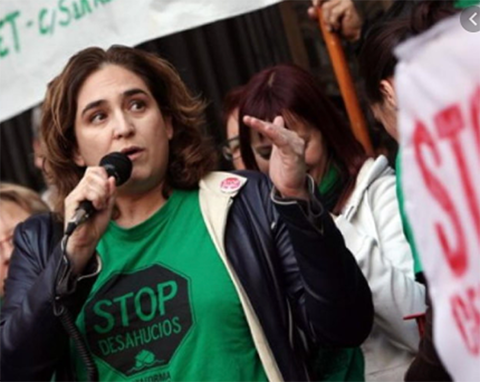
Ada Colau
In this way, the women who champion municipalism and bring the ‘feminisation of politics’ to society are doing some of the work that feminism always aimed to do, but never before found an effective container for. Rather than try to describe this phenomenon through my own lenses and words, here are Laura Roth[10] and Kate Shea Baird[11] explaining the wider context in the US Solidarity Economy Network:
Although writers like Paolo Gerbaudo have argued for the radical potential of a left-wing populist politics, in terms of its understanding of democracy the idea of sovereignty often remains limited to the winning of elections or referendums. But feminizing politics means going beyond the mere expression of preferences at the ballot box. It means using deliberative mechanisms that allow all citizens to participate and have a real impact in the decisions that affect their daily reality. Such mechanisms also have the potential to change how people see themselves and their role in society. While populist democracy reinforces existing roles and preferences, feminized politics allows for learning about others’ circumstances, mutual understanding, and decisions that better reflect the realities of everyone who participates in them.
Populism’s focus on the nation, with its patriarchal and colonial origins, is also deeply problematic for any attempt to feminize politics. After all, the first subjects colonized by the nation are its women, who are expected to undertake reproductive work in its service. In the face of a return to patriotism, a feminized politics seeks alternative ways to motivate collective action towards shared objectives. This means building shared identities based on real interactions within communities, with concrete activities and goals.
Laura Roth
Feminized politics rejects the strong, personal, usually male leadership favoured by populism. Though left-wing populist movements in Latin America have put some emphasis on the construction of power within communities, this has been primarily instrumental, aimed at maintaining governments in power rather than transforming society from below. Demasculinizing politics means promoting collective models of leadership that listen and aren’t afraid of expressing contradictions or doubt. According to María Eugenia R. Palop, a transformational, feminized leadership is one that “promotes teamwork, horizontality, participation and power-sharing.
Finally, left-wing populism and feminized politics operate on different timescales. Advocates of populism often use urgency to justify bypassing the feminizing agenda, usually driven by the electoral calendar or political crisis. The goal of winning elections, of stopping the right, they say, is too important for us to focus on the painstaking development of bottom-up, collective processes.
The problem is that accepting this premise means accepting that it may never be the right moment to transform gender relations — there will always be a new election or crisis just around the corner. Adopting a feminizing approach means committing to the idea that ways of doing determine outcomes, and that focusing on them has the greater transformative potential over the longer term.
In another piece, from Roar Magazine, Laura and Kate say:
The feminisation of politics, beyond its concern for increasing presence of women in decision-making spaces and implementing public policies to promote gender equality, is about changing the way politics is done. This third dimension of feminisation aims to shatter masculine patterns that reward behaviour such as competition, urgency, hierarchy and homogeneity, which are less common in – or appealing to – women. Instead, a feminised politic seeks to emphasise the importance of the small, the relational, the everyday, challenging the artificial division between the personal and the political. This is how we can change the underlying dynamics of the system and construct emancipatory alternatives.
Kate Shea-Bird
Given that current power structures can only be reconfigured through everyday practices, it could well be that municipal politics is a better sphere of action than working at national or European scale. Acting at a trans-local, even global, level is of great importance, but it is our view that the feminization of politics should start locally, because that’s where the foundation of any multi-level approach can be laid. The question of the role of municipalism in the feminization of politics is a question we will leave for another time.”
And here is Laura holding a workshop on the ‘feminisation of politics’. Although much more is conveyed by watching it, here are some of the points and methods she brings:
- Masculinity is a privilege. Within masculine cultures, feminism appears as new policy, numbers of women politicians etc.
- Feminisiation is much more and is happening at municipal level.
- We are changing structure, ways of working, relationship, time-tables and priorities.
- This is not about feminine ways, being nicer – things we associate with the feminine.
- This not a thing for women: it’s for everyone.
- It’s about a way to help everyone feel at home in politics.
- To see the problem as one that exists between men and women is an over-simplification. From the point of view of intersectionality, this is a movement against oppression. About privilege itself, not just male privilege.
- We are not trying to win access to the same privilege for some women that men previously had: there are forms of feminism that just want to take over the space that men have, in the male culture.
- Still important to say that politics is a space for privileged men and in many cases it is men that should adapt: it is their job to make women feel more comfortable. Not adopting female ways, but leaving behind masculine ways that privilege only them
- There are more ways of working and behaving that belong to women that are more valuable to everyone.
- We should remember also that gender is a continuum – not a binary.
- We want feminism to become a cross-cutting thing – not just for groups of women, making proposals.
- Can we keep it in mind all the time even when there are bigger priorities?
- Why is this so big in municipalist environment? Because this is where we are building political power where actually people live and interact with each other. Rather than nation states.
- Local organisations sometimes run for elections, sometimes not. But they are all building power. We should engage local public institutions, social movements and citizens in different collectives that allow them to build political power and change behaviour.
- There is a good fit between feminism and municipalism – because it looks at how politics is done. Not just about winning and being in charge but changing how we relate to each other.
- This is different from traditional politics – often typically on the left. Vertical big organisations that have a theory of what’s going on and putting that in front and often failing. But being right about what needs to be done is not the same as working with the people.
- In that, feminism is a good ally.
- Feminisation of politic is easier to do at small scale. You can create more time to connect.
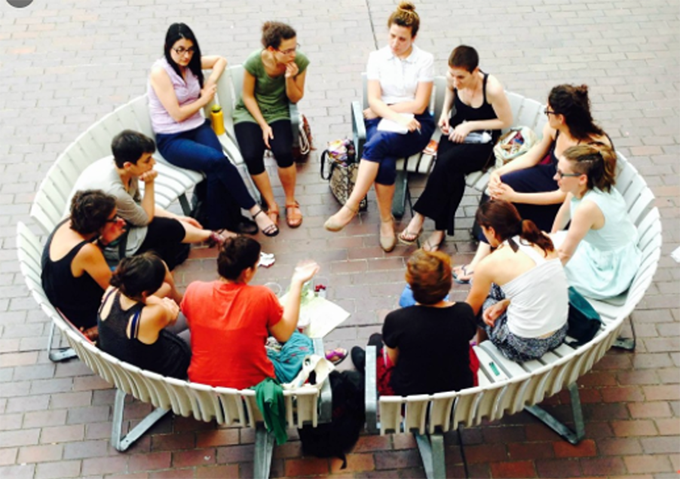
Feminisation of Politics in Barcelona
Laura introduces the following which came from the municipalist movement Fearless Cities[12]: the 7 dimensions of the feminisation of politics:
- Gender balance: this should not only be making a visible difference in the public space through equal numbers, but internally distributing responsibility, including care, within groups
- Power – how is it understood in feminism? Cooperation rather than confrontation
- Leadership – should not be about the strongest
- Care – this is not just about taking care of children or elders who depend on us, but also how we make sure that care is a consideration in all our relationships with peers. Take care of each other in everything we do. Always part of the political agenda. Also self-care.
- Participation and democracy – decision making. Are we self-governed? Includes all the above
- Diversity and intersectionality: looking at all forms of oppression.
- Non-violence – all kinds, verbal, psychological, environmental violence are included. Whatever makes people feel pushed out of their rightful space
In a breakout section in the workshop, there is a question from a black woman – referring to complaints about how the stories of other black people were ignored in the feminisation of politics movement. She asked Laura “what are you doing about it” to which she answered: “When we started doing Fearless Cities we didn’t think race was a relevant topic. In Europe, we felt it was different from South Africa or Brazil where it was higher. With non-violence, proving hardest to address.”
“Our practice was, rather than asking people to participate in our movement, find out what the people you meet need and expect. E.g. migrants did not want to come to assemblies. We guessed they thought it would be hostile. It’s trial and error, finding out what they are interested in.”
“From that perspective, the door? to door campaign was good. We got very diverse participation. It was clear that some people don’t want to take part in assemblies or decision making… maybe because they don’t like the way we do it. Our approach and dynamics was not appealing. We should continue to look more into why more black people don’t come. At the moment, there are more challenges than answers.”
“In South Africa and Brazil they call this an anti-racist, municipalist, feminist, political project. It’s in the title. They have a member in the national parliament, state and 2 in city parliaments – all women, two black, one lesbian etc. In the other organisations we work with, the visible faces are in most cases men, and the ones working on race are in the margins of society.”
“Response: minorities reluctant to take part if they feel there is no representation of their voice, that they have to hold it on their own. Invite in, allow to take the lead too”.
Laura concludes by saying ““At this point, there is little to share, more to learn”.
The Alternative journey
If you have read the essay on Political Alternatives in this issue, you will know that I founded The Alternative UK with only the minimum of knowledge about Spain’s feminisation of politics: I was more compelled by Uffe Elbaek’s dance energy (the rationale for which he, in turn, picked up from anarchist Emma Goldman who claimed: “I don’t want be part of your revolution if I can’t dance”)!
Even so, together with my Co-initiator Pat Kane, I came to the same conclusions as Ada, Laura and Kate very quickly: that to make change possible you need to work at the community level, where people live, within containers small enough to hold relationship. Those spaces will naturally be held mostly by women, because women have always done the majority of unpaid and low paid work that holds communities together. Women who, even when they are forced to take badly paid jobs to bring in some money, are still doing the lion’s share of bringing up the children and looking after the elderly. They are still the natural community networkers for these reasons. In the spaces in which they are in a majority, they bring the practices that Laura and Kate describe – allowing multiple and quiet voices to be heard – quite easily.
However, as we have worked with The Alternative bringing the experience of our decades of seeking feminisation in other parts of society, I am less convinced that municipalism will be enough to hold the potential of feminisation and may even become an obstacle if held too tightly. The current political system is unfit for purpose: having been designed to represent people with next to no provision for their active participation, it has and continues to guarantee the elites their dominance. Even if one or two of the less privileged people make it through the system to the top of a party or even to become MP, that person has no mechanisms to bring the voices of the people with him or her, other than to invite a yes or no every five years.
Within this, the culture and structure of current politics has been designed entirely by men in past centuries. It has given rise to the growth economy including the military industrial complex, which continues to have a stranglehold on modern economies. That in turn has instrumentalised the majority of human beings – both men and women – to the consumer society, based on an idea of merit that only creates value for the perpetuation of that political settlement. One that excludes the people who have historically been disadvantaged. And in so doing, endangers the future for everyone. Men suffer directly: occupying 86% of prisons, 90% of front line military, dying earlier than women of natural causes and committing suicide in much greater numbers.
While much of our politics has access to this knowledge, it does not have access to the resources that would make a difference. Namely the real power of people’s individual and collective agency – arising from their imagination and creativity – to re-imagine and re-build our society in ways that benefit everyone. Because women have historically been kept in the home to nurture the family, their understanding of both human strengths and weaknesses, needs and offerings is part of their cultural heritage. You might say it is because women understand care and flourishing that they do care and cause flourishing. But also that their idea of a human being is wholistic: they see much more in a person than their working potential, their ability to succeed or fail within the current rat race. They see the spark of individuality in a child that no-one else sees and continue to see that in adults too.
For that reason, women need to be at the heart of the design process of a new society. Where old models have failed, rather than improve incrementally upon the old model, they are already evoking new visions of a society that could respond directly to the crises we are now facing. Check out Rising Women, Rising World for female initiatives at every level of our socio-political-economic system that understand how things could change. Most of these are outside of the political discourse altogether. For much more on that, sign up to the Daily Alternative.
As it stands, it remains very difficult to get traction for change at the heart of politics. Opening up municipalism to the feminisation of politics is an exciting piece of the puzzle. But as Laura says, there are so many unanswered questions. Ada Colau, after 5 years in office, says she cannot change politics from where she operates – the culture both inside and outside the political / municipal realm is too strong.
If we were all to invest in municipalism, what would happen to the changing culture beyond the cities? Would it not still be subject to the national and international socio-economic-political systems that keep us all in thrall? Politics needs to be in partnership with the changes happening in the broader society – where most women are bringing all those exluded with them – to get the traction it needs to create a genuinely new political structure and culture beyond parties. Within a community that means political activism opening up to broader community action – social enterprise, the arts, self-help, spirituality, sports, leisure and more. Where the energy is.
Other than as services, the creativity of these areas might not be captured by a municipal agenda, not least because of the reputation of civic duties as dull and lifeless. Instead we propose new ‘constitutes[13]’ – fluid, temporary, institutions – like citizen action networks (CAN), that would invite the social energy and creativity for change. While this can develop more freely outside of the political agenda for change, it can partner with it, to get traction between them.
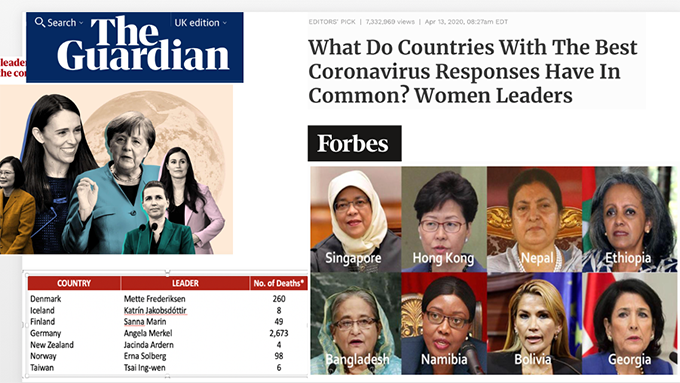
A new partnership between people and power
Transition Towns is an example of a community movement that resists any political framing or co-opting and has feminism at the core of its operations. However, as a CAN, it can nominate enough people to take over a local council – such as what happened in Frome, giving rise to the Flatpack Democracy movement. Once Transtioners and friends are running the council, they can change the rules and practices of the council to allow the participatory culture of the CAN to prevail. However, the CAN persists as the place in which whole society, people power continues to develop most freely.
It is subtly different in concept from municipalism, but partnering with municipalism to make change happen at the city level. Flatpack Councils would answer to municipal councils while Transition Towns stay independent of them (but shaping them). In different parts of the country, quite different CANs appear to capture the more urban identities of Birmingham or Newcastle.
In this scenario and with a proportional system, it is much more feasible that Alternativet could thrive in Denmark long term, championing such a partnership between parties and people. It will be necessary too, to have a national level constitute that holds the people’s clear intentions, still independent of party politics. In the UK that might mean a Second Chamber run by Citizens Assemblies – or something not yet imagined.
This continuing autonomy of people power would allow the female intelligence to keep developing and shaping politics from both within, through equal representation, and without party politics where the feminine is increasingly transforming the public space. If you doubt that, think about the power of networks, the proliferation of new forms of intelligence – emotional, psychological, spiritual – and the steady progress of diversity. If bringing in women means bringing in all those left behind, the rapid shifts in our culture over the past decade is proof that society is broadly moving towards integration. What that brings with it in terms of enlivenment – as Karen O-Brien describes it in her new book You Matter More Than You Think (see article by Karen in this issue) – will cause quantum social change.
Within this bigger picture, we need the feminisation of politics to directly affect the systems of power from within. To make that more likely, we have to create all forms of CANs to concentrate the feminisation from outside of the current political system too, creating the conditions for change.
This dual domain partnership, is the new politics.
Endnotes
[1] Female or feminine intelligence, for example as described by thrice nominated Nobel Peace Prize winner Scilla Elworthy in her many books: Feminine Intelligence, The Power of Yin, Sex and Power and the Business Plan for Peace.
[2] Guardian articles on Soft Power https://www.theguardian.com/profile/indraadnan
[3] Soft Power Agenda: from strategy to paradigm
[4] Raising a boy shifted my perspective entirely and continues to do so. Touched upon here, but yet to be captured properly in my writing. Maybe his life and times will do that for me.
[5] More on this here: https://www.weforum.org/agenda/2018/04/women-are-still-not-asking-for-pay-rises-here-s-why/
[6] Michel Houellebecq: The Map and the Territory
[7] For the story of feminine as complex, read Carole Gilligan: In Another Voice (1977).
[8] The Great British Dream Factory by Dominic Sandbrook is one of many books written about this subject.
[9] For more on the relationship between !5M, En Comu and Podemos see: https://www.opendemocracy.net/en/can-europe-make-it/24m-it-was-not-victory-for-podemos-but-for-15m-movement/
[10] Laura Roth Roar Magazine: Laura Roth is a political philosopher and activist. Her research and activism focus on municipalism, feminism, democracy and political culture. She’s a member of Minim Municipalist Observatory.
[11] Kate Shea Baird is based in Barcelona where she works in international advocacy for local govrnments. She has written on Catalan and Spanish politics for Novara Media, Red Pepper, Open Democracy, Indy Voices, Planeta Futuro, Sentit Critic and Media.cat. Kate has participated in the municipal platform Barcelona en Comú since June 2014.
[12] For more on Fearless Cities: http://fearlesscities.com/en
[13] The theory of constitutes described here by Pat Kane, Co-initiator of The Alternative UK. https://www.slideshare.net/theplayethic/what-is-a-constitute-2020-answer-pat-kane
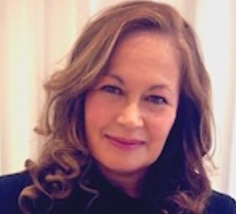 Indra Adnan is Co-Initiator of The Alternative UK, a political platforms inspired by Alternativet in Denmark. Her commitment is to networked grassroots politics that release the power of people and communities to sustain the planet and that reconnect people to the local eco-systems of solutions available (I, We, World). She is concurrently a journalist (The Guardian, Huffington Post), a a psycho-social therapist (Human Givens Institute), founder of the Soft Power Network (consulting to Finnish, Brazilian, Danish and British governments), Buddhist, Futurist, School Governor and Mother. Recent publications include Is The Party Over? and New Times, and e-book Soft Power Agenda, available on www.indraadnan.com. Indra is currently writing The Politics of Waking Up: Power and Possibility in the fractal age, to be published by Perspectiva Press this year. She has been co-opted by IFIS to be part of the LiFT Politics team.
Indra Adnan is Co-Initiator of The Alternative UK, a political platforms inspired by Alternativet in Denmark. Her commitment is to networked grassroots politics that release the power of people and communities to sustain the planet and that reconnect people to the local eco-systems of solutions available (I, We, World). She is concurrently a journalist (The Guardian, Huffington Post), a a psycho-social therapist (Human Givens Institute), founder of the Soft Power Network (consulting to Finnish, Brazilian, Danish and British governments), Buddhist, Futurist, School Governor and Mother. Recent publications include Is The Party Over? and New Times, and e-book Soft Power Agenda, available on www.indraadnan.com. Indra is currently writing The Politics of Waking Up: Power and Possibility in the fractal age, to be published by Perspectiva Press this year. She has been co-opted by IFIS to be part of the LiFT Politics team.
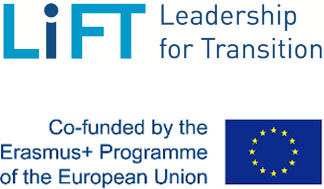
Die Medieninhalte und alle weiteren Beiträge dieser Homepage finanzieren sich über Euch, unsere Leser:innen.
Bitte unterstützt uns nach Euren Möglichkeiten – egal ob mit einer kleinen oder größeren Einzelspende oder einer monatlichen Dauerspende.

